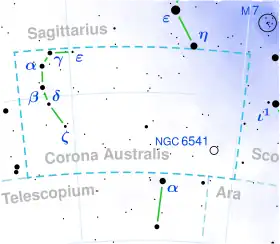Gamma Coronae Australis (γ CrA), is a binary star located in the constellation Corona Australis. The system has a combined apparent visual magnitude of 4.20,[2] making it faintly visible to the naked eye. It is located 56.4 light-years (17.3 parsecs) from the Sun, based on its parallax.[1] Gamma Coronae Australis is a member of the Milky Way's thin disk.[6]
The system is a visual binary, where the orbit is calculated from observations of one star orbiting the other. The primary, Gamma Coronae Australis A, is a late F-type main-sequence star with an effective temperature of 6,090 K.[6] It has an absolute an absolute magnitude of +3.73, and a mass of 1.15 solar masses.[6] The secondary, Gamma Coronae Australis B, is also F-type. With an effective temperature of 6,100 K, an absolute magnitude of +3.80, and a mass of 1.14 solar masses, the companion is almost identical to the primary.[6] Gamma Coronae Australis has been known to be a binary for a long time, and its two components have been given Henry Draper Catalogue designations of HD 177474[8] and HD 177475,[9] respectively. The two stars are separated by 1.896″ and orbit each other every 121.76 years.[7]
References
- 1 2 3 4 5 6 van Leeuwen, F. (November 2007). "Validation of the new Hipparcos reduction". Astronomy and Astrophysics. 474 (2): 653–664. arXiv:0708.1752. Bibcode:2007A&A...474..653V. doi:10.1051/0004-6361:20078357. S2CID 18759600.
- 1 2 3 "* gam CrA". SIMBAD. Centre de données astronomiques de Strasbourg. Retrieved 20 June 2017.
- ↑ Eggl, S.; Pilat-Lohinger, E.; Funk, B.; Georgakarakos, N.; Haghighipour, N. (2012). "Circumstellar habitable zones of binary-star systems in the solar neighbourhood". Monthly Notices of the Royal Astronomical Society. 428 (4): 3104. arXiv:1210.5411. Bibcode:2013MNRAS.428.3104E. doi:10.1093/mnras/sts257.
- 1 2 Mermilliod, J.-C. (1986). "Compilation of Eggen's UBV data, transformed to UBV (unpublished)". Catalogue of Eggen's UBV Data. Bibcode:1986EgUBV........0M.
- ↑ Gontcharov, G. A. (2006). "Pulkovo Compilation of Radial Velocities for 35 495 Hipparcos stars in a common system". Astronomy Letters. 32 (11): 759–771. arXiv:1606.08053. Bibcode:2006AstL...32..759G. doi:10.1134/S1063773706110065. S2CID 119231169.
- 1 2 3 4 5 6 Fuhrmann, K.; Chini, R. (2015). "Multiplicity Among F-Type Stars. II". The Astrophysical Journal. 809 (1): 107. Bibcode:2015ApJ...809..107F. doi:10.1088/0004-637X/809/1/107. S2CID 126218052.
- 1 2 "Sixth Catalog of Orbits of Visual Binary Stars". United States Naval Observatory. Archived from the original on 1 August 2017. Retrieved 20 June 2017.
- 1 2 "* gam CrA A". SIMBAD. Centre de données astronomiques de Strasbourg. Retrieved 20 June 2017.
- 1 2 "* gam CrA B". SIMBAD. Centre de données astronomiques de Strasbourg. Retrieved 20 June 2017.
